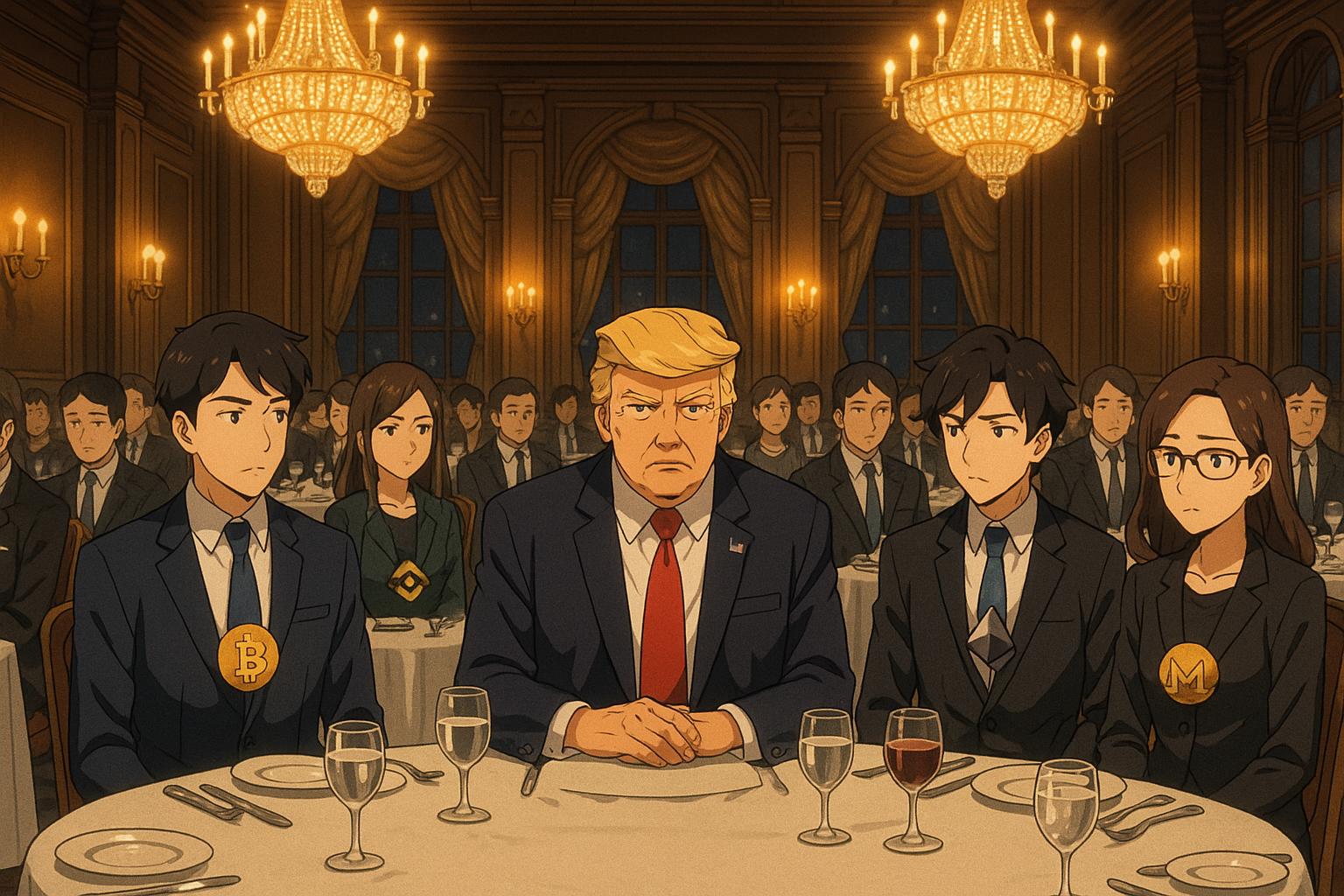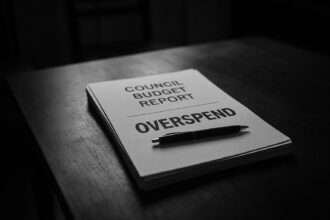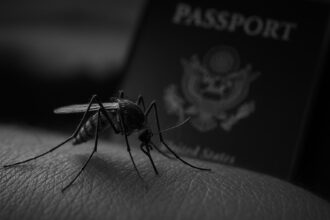Next week’s exclusive dinner at Trump National Golf Club, where guests paid massive sums for access through the $TRUMP cryptocurrency, highlights troubling entanglements of wealth, political power, and foreign influence, provoking growing controversy over conflicts of interest and governance standards.
Next Thursday, an extravagant gathering is poised to take place at the Trump National Golf Club near Washington, D.C., where 220 privileged guests will mingle beneath the glittering chandeliers. Each attendee, a cryptocurrency investor, has been handpicked to join a dinner featuring none other than President Donald Trump. Dubbed “the most exclusive invitation in the world,” this event is not just about politics—it represents a troubling blend of luxury, profit, and ethical concerns.
Those in attendance gained their invitation by purchasing $TRUMP, a cryptocurrency token that made its debut just days before Trump assumed office. To join this elite dinner, guests reportedly needed to invest around $55,000 each, while those seeking access to the pre-dinner reception had to fork over a staggering $4.3 million. Among the high-profile attendees is Justin Sun, a billionaire known for his lavish spending on surreal art pieces, including a $6.2 million banana artwork.
Although gatherings of wealthy financiers often aim to facilitate government investment or reward past political favours, the ethical ramifications of Trump’s dinner raise serious questions. Attendees are being rewarded not for charitable contributions or civic engagement but for directly lining Trump’s pockets. With around $148 million spent on $TRUMP tokens, the cryptocurrency’s value has skyrocketed to over $2.7 billion, benefiting those willing to pay to play.
Critics have sounded alarms about the glaring conflicts of interest posed by Trump’s ongoing participation in this cryptocurrency venture. Senator Chris Murphy decried the event as a “stunning example of corruption,” highlighting Trump’s disingenuous promises to maintain a separation between his business and political dealings. The lines between public service and self-interest are becoming increasingly blurred.
This controversy deepens with Trump’s recent acceptance of a luxury Boeing 747 from Qatar worth $400 million, seen by many as another instance of a president commodifying his position. Critics are rightfully concerned about the ethical implications of accepting gifts from foreign entities, particularly when Trump has previously labeled Qatar a “funder of terrorism.” The question lingers: is this aircraft merely a token of goodwill, or could it serve to create advantageous business conditions for Trump?
While the White House asserts that the plane will be incorporated into the official Air Force One fleet and not kept as a personal asset, skepticism remains high. Many view it as a significant benefit to Trump’s private ventures, especially considering Qatari investments are part of broader deals that have enriched the Trump Organisation since his return to office, including plans for a luxury resort in Doha.
The Trump administration’s foray into cryptocurrency further complicates the narrative, especially as it explores the balance between investment and ethical standards. As the U.S. relaxed its enforcement on cryptocurrency, losses for smaller investors soared to nearly $4 billion—while wealthier investors reaped rewards of around $1.5 billion.
Trump’s present enthusiasm for cryptocurrency marks a departure from his previously critical stance, illustrating a more entrenched commitment to this sector. His ventures, from launching a meme coin to promoting luxury crypto-themed products, not only signify his expanded influence but also beckon questions about the implications for ordinary investors caught in a tumultuous market.
The notion that foreign investors could manipulate these ventures for their own advantage in exchange for political favours invokes serious constitutional concerns. Trump’s strategy not only breeds unease among critics but also raises doubts among some of his most ardent supporters, many of whom feel that indulging in lavish gifts from foreign leaders undermines American values.
In stark contrast, the new leadership has signaled intentions to scrutinize ethical violations involving cryptocurrency dealings among public officials, proposing measures to prevent politicians from profiting from such ventures while in office.
As the countdown to next week’s event continues, one thing remains abundantly clear: the intersection of wealth, politics, and ethics is increasingly defining the current administration in troubling ways. Calls for accountability and transparency are growing louder, compelling both supporters and opponents to examine whether this approach to governance can withstand the test of scrutiny or lead to an unforeseen backlash.
Source: Noah Wire Services
- https://www.dailymail.co.uk/news/article-14720767/Why-Trumps-supporters-growing-queasy-hes-shamelessly-using-Presidency-make-family-billions.html?ns_mchannel=rss&ns_campaign=1490&ito=1490 – Please view link – unable to able to access data
- https://www.reuters.com/world/us/buyers-trump-meme-coin-pay-millions-win-dinner-with-president-trump-2025-05-12/ – Buyers of U.S. President Donald Trump’s $TRUMP meme coin are vying for a chance to attend an exclusive dinner with him on May 22. The top 220 ‘time-weighted’ holders of the coin, worth $160 million combined, will be invited to the event, with the top 25 additionally receiving VIP perks. The $TRUMP coin was launched just before Trump’s inauguration and experienced volatile trading, now valued around $14 per coin. Blockchain analysis shows significant involvement from Seychelles-based HTX exchange, linked to Chinese entrepreneur Justin Sun. Critics, including Democratic lawmakers, raise concerns about ethical conflicts and foreign influence, especially since Trump’s family still profits from the coin while he downplays involvement. The Trump Organization stated his assets are held in a trust managed by his children. Meanwhile, U.S. agencies, including the SEC and DOJ, face scrutiny over relaxed crypto enforcement. Losses for smaller investors have reached nearly $4 billion, though large investors gained up to $1.5 billion. The coin is part of a broader Trump crypto venture including ETFs, trading platforms, crypto mining, and stablecoins. Lawmakers have introduced legislation to prevent politicians from profiting from cryptocurrencies while in office. ([reuters.com](https://www.reuters.com/world/us/buyers-trump-meme-coin-pay-millions-win-dinner-with-president-trump-2025-05-12/?utm_source=openai))
- https://www.axios.com/newsletters/axios-crypto-fa5b4790-2c4f-11f0-8ce4-89f34dc9bfc1 – The newsletter discusses recent developments in cryptocurrency regulation and controversies surrounding former President Donald Trump’s involvement in crypto projects. A major highlight is the SEC Chair’s intent to facilitate compliant token sales, signaling a significant shift for the blockchain industry. Meanwhile, several pieces of congressional legislation aim to restrict elected officials from endorsing or financially benefiting from cryptocurrencies, motivated by Trump’s association with crypto projects like the Official Trump coin and USD1 stablecoin via World Liberty Financial. Bipartisan stablecoin bills have stalled amid conflict-of-interest concerns after Abu Dhabi’s $2 billion investment in Binance using USD1. World Liberty is planning a USD1 airdrop to WLFI token holders, raising questions about the token’s value and tradeability. Elsewhere, Celsius founder Alex Mashinsky received a 12-year sentence for fraud, following a series of high-profile crypto collapses. Additional industry updates include Coinbase joining the S&P 500, USDC expansion by Stripe, and Meta’s stablecoin applications. Finally, the Senate has yet to act on Brian Quintenz’s nomination to head the CFTC, a key regulatory position for crypto governance. ([axios.com](https://www.axios.com/newsletters/axios-crypto-fa5b4790-2c4f-11f0-8ce4-89f34dc9bfc1?utm_source=openai))
- https://www.axios.com/newsletters/axios-crypto-a061a960-1dd1-11ef-92e4-1fbb1a8da1b6 – Former President Donald Trump has made a surprising turn in his stance on cryptocurrency, now showing support for it, despite previously criticizing it in 2019. His endorsement has potential political implications as the U.S. heads towards the presidential election, given crypto’s significant financial influence. Trump disclosed substantial crypto holdings, further emphasizing his new favorable position. Concurrently, a meme coin honoring Trump has surged by over 17,000% this year. On another note, the Mt. Gox exchange is expected to distribute part of its $9 billion bitcoin holdings soon, which could impact bitcoin prices. Additionally, major developments in the crypto world include BlackRock amending its S-1 for an ether ETF, Gnosis Pay’s Visa access in Europe, DBS’s significant ether holdings, and the launch of Astaria, a lending platform. ([axios.com](https://www.axios.com/newsletters/axios-crypto-a061a960-1dd1-11ef-92e4-1fbb1a8da1b6?utm_source=openai))
- https://apnews.com/article/2b49fd975e2cce7a6f61e068f6fd04af – Donald Trump has embraced the cryptocurrency sector, promoting various digital currency-related products and promising to make the U.S. the digital assets capital of the world. Trump’s ventures include launching a meme coin that faced significant volatility, introducing a $100,000 Trump-themed watch sold exclusively in bitcoin, and supporting a crypto finance platform with extensive investments. Products endorsed by Trump include $299 crypto-themed sneakers. Additionally, the Trump-affiliated Truth Social plans to expand into cryptocurrency-related investments. Despite critics’ concerns over potential abuses and reputation impacts, Trump’s ventures demonstrate his commitment to integrating cryptocurrency into his business and political endeavors. ([apnews.com](https://apnews.com/article/2b49fd975e2cce7a6f61e068f6fd04af?utm_source=openai))
- https://www.reuters.com/technology/trump-connection-why-some-bought-world-liberty-financial-tokens-2025-01-23/ – Crypto investor Mike Dudas purchased $145,000 worth of tokens from World Liberty Financial, a company partly owned by President Donald Trump, just before Trump’s inauguration. The tokens, which grant voting rights on company decisions, were bought due to Dudas’ connections with the project’s advisers and his belief in the company’s vision for decentralized finance (DeFi). World Liberty Financial has raised over $300 million from selling tokens, attracting notable investors including Justin Sun, who spent at least $75 million. Despite concerns about conflicts of interest, ethics experts claim Trump has not violated any laws. Several investors cited Trump’s involvement as a key factor in their decision to buy the tokens. However, potential risks remain regarding Trump’s influence and ongoing investigations into some of the investors. ([reuters.com](https://www.reuters.com/technology/trump-connection-why-some-bought-world-liberty-financial-tokens-2025-01-23/?utm_source=openai))
- https://apnews.com/article/75bf67ef9e6e54bf455f2f9f03470be3 – El presidente electo Donald Trump ha lanzado un nuevo token de criptomoneda, lo que podría aumentar su patrimonio neto justo antes de su toma de posesión. Trump promovió este token con la imagen de su puño levantado junto a las palabras “FIGHT FIGHT FIGHT,” en referencia a su respuesta a un intento de asesinato el pasado julio. Aunque las ventas del token están destinadas a ser una expresión de apoyo y no una oportunidad de inversión, su valor ha subido drásticamente, antes de caer después de que Trump y su esposa, Melania Trump, introdujeron un meme coin similar para ella. La comunidad cripto celebró el lanzamiento, viéndolo como un apoyo a una industria que se sintió atacada durante la administración Biden, mientras que los críticos advirtieron sobre los riesgos de influencia extranjera. El token está organizado por CIC Digital, una afiliada de la Organización Trump, que planea emitir mil millones de tokens en tres años. Además, Trump tiene un historial en la comercialización de criptomonedas y NFT, habiendo ganado entre $100,000 y $1 millón con tarjetas comerciales digitales el año pasado. ([apnews.com](https://apnews.com/article/75bf67ef9e6e54bf455f2f9f03470be3?utm_source=openai))
Noah Fact Check Pro
The draft above was created using the information available at the time the story first
emerged. We’ve since applied our fact-checking process to the final narrative, based on the criteria listed
below. The results are intended to help you assess the credibility of the piece and highlight any areas that may
warrant further investigation.
Freshness check
Score:
8
Notes:
The narrative discusses current events and ongoing controversies surrounding Trump’s presidency, suggesting it is relatively recent. However, specific details like the exact date of the event could make it more definitive.
Quotes check
Score:
5
Notes:
The quote from Senator Chris Murphy is identified as a critical statement but lacks an original source or date. It appears to be a reference to a previous criticism rather than a novel quote.
Source reliability
Score:
6
Notes:
The narrative originates from the Daily Mail, which is known for its sensationalist reporting style. While it covers significant political events, its reliability can vary due to potential biases.
Plausability check
Score:
9
Notes:
The claims about Trump’s involvement in cryptocurrency and ethical concerns are plausible given the context of recent political discourse. The narrative aligns with known controversies surrounding Trump’s business dealings.
Overall assessment
Verdict (FAIL, OPEN, PASS): OPEN
Confidence (LOW, MEDIUM, HIGH): MEDIUM
Summary:
The narrative’s focus on recent political events and ethical controversies suggests it is relatively fresh and plausible. However, the lack of specific quotes with original sources and the potential for bias in the source undermine its reliability. Further verification is needed to fully assess its accuracy.













